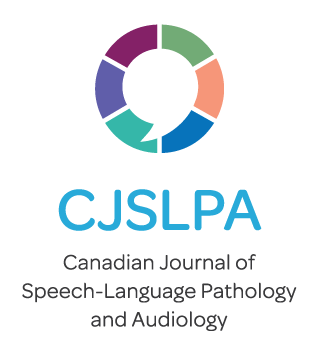

| Author(s) |
Elizabeth Rochon Sonia Reichman |
| Volume | 27 |
| Number | 4 |
| Year | 2003 |
| Page(s) | 202-210 |
| Language | English |
| Category | |
| Keywords |
sentence production aphasia treatment grammatical frames mapping therapy |
| Abstract |
Abstract This study investigated a treatment for sentence production impairment in an individual with aphasia. Treatment was administered in two modules: the first involved training single verb naming, the second involved training sentence production. The sentence production treatment incorporated the principles of grammatical frame therapy (Mitchum & Berndt, 1994) and mapping therapy (Schwartz, Saffran, Fink, Myers, & Martin, 1994). Despite improved performance on verb naming after treatment for single verb naming, there were no improvements on measures of sentence production or comprehension. Treatment of passive sentences in the second module led to improvements in production of passive and active sentences after therapy. In addition, passive sentence production improved on two other generalization tasks, however, performance on active sentences deteriorated after treatment. Gains also were noted on a narrative retelling task. There were no changes in sentence comprehension after training sentence production. Implications for interventions aimed at sentence processing impairments are discussed. Cette étude faisait l’analyse d’une méthode de traitement de difficultés de production de phrases chez un individu atteint d’aphasie. Ce traitement est administré en deux modules: dans le premier, il s’agit d’un entraînement à nommer des verbes et dans le second, à produire des phrases. Ce traitement de la production des phrases est basé sur les principes de la « thérapie du cadre grammatical » de Mitchum & Berndt (1994) et de la thérapie de la représentation une à une proposée par Schwartz, Saffran, Fink, Myers, & Martin (1994). Malgré l’amélioration post-traitement de la performance à nommer des verbes après le premier module du traitement, aucune amélioration n’a été notée en production et en compréhension de phrases. Le traitement des phrases passives, lors du second module, a permis l’amélioration de la production de phrases actives et passives. De plus, la production de phrases passives s’est améliorée dans le cadre de deux tâches de généralisation. Cependant, la performance concernant la production de phrases actives s’est détériorée après le traitement. Des gains ont aussi été notés au niveau de la narration lors de tâches où il s’agissait de raconter à nouveau une histoire. Il n’y avait aucun changement au niveau de la compréhension des phrases après le traitement visant la production des phrases. À la fin de l’article, l’auteur discute des implications au niveau des interventions visant à traiter les difficultés d’intégration des phrases. |
| Record ID | 840 |
| Link | https://cjslpa.ca/files/2003_JSLPA_Vol_27/No_04_185-232/Rochon_Reichman_JSLPA_2003.pdf |
CJSLPA is an open access journal which means that all articles are available on the Internet to all users immediately upon publication. Users are allowed to read, download, copy, distribute, print, search, or link to the full texts of the articles, or use them for any other lawful purpose.
CJSLPA does not charge authors publication or processing fees.
Copyright of the Canadian Journal of Speech-Language Pathology and Audiology is held by Speech-Language and Audiology Canada (SAC). Appropriate credit must be given (SAC, publication name, article title, volume number, issue number and page number[s]) but not in any way that suggests SAC endorses you or your use of the work. You may not use this work for commercial purposes. You may not alter, transform, or build upon this work.